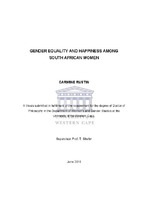| dc.contributor.advisor | Shefer, Tamara | |
| dc.contributor.author | Rustin, Carmine Jianni | |
| dc.date.accessioned | 2019-01-30T11:33:13Z | |
| dc.date.available | 2019-01-30T11:33:13Z | |
| dc.date.issued | 2018 | |
| dc.identifier.uri | http://hdl.handle.net/11394/6511 | |
| dc.description | Philosophiae Doctor - PhD | en_US |
| dc.description.abstract | Have South African women's lives become happier since the transition to
democracy? If they are, could this be linked to gender equality? This is the
central question of this study. This study explored a group of women’s
subjective experiences of gender equality, by which I mean equality on the
basis of gender; and happiness, which refers to women’s life satisfaction and
their affective state. It further explores whether gender equality and happiness
are linked. The study assumed that everything being equal, endeavours to
liberate women from patriarchy and towards gender equality enhance
women’s happiness. 1994 ushered in a democratic South Africa and
numerous legislative and policy changes were introduced that affect women.
Considerable gains have been made at the constitutional and political levels
for women’s equality and gender justice. This is reflected in the rankings of
South Africa on many different indices. Yet, we see numerous challenges
facing women including poverty and gender-based violence. This study
examined whether the presence of a range of policies as well as affirmative
and protective measures for women have impacted on how they experience
their lives. In particular, do they feel that they are happy and do they see
happiness as linked to gender equality efforts? Given the research question,
this study was grounded within a feminist framework. A mixed methods
approach utilising both qualitative and quantitative methods was employed. | en_US |
| dc.language.iso | en | en_US |
| dc.publisher | University of the Western Cape | en_US |
| dc.subject | Feminism | en_US |
| dc.subject | Happiness | en_US |
| dc.subject | Life Satisfaction | en_US |
| dc.subject | Affect | en_US |
| dc.subject | Feminism | en_US |
| dc.subject | Mixed-Methods | en_US |
| dc.subject | Postcolonial Theory | en_US |
| dc.subject | Social Constructionist Theory | en_US |
| dc.subject | Intersectionality | en_US |
| dc.subject | Capability Approach | en_US |
| dc.subject | Gender Equality | en_US |
| dc.title | Gender equality and happiness among South African women | en_US |
| dc.rights.holder | University of the Western Cape | en_US |

